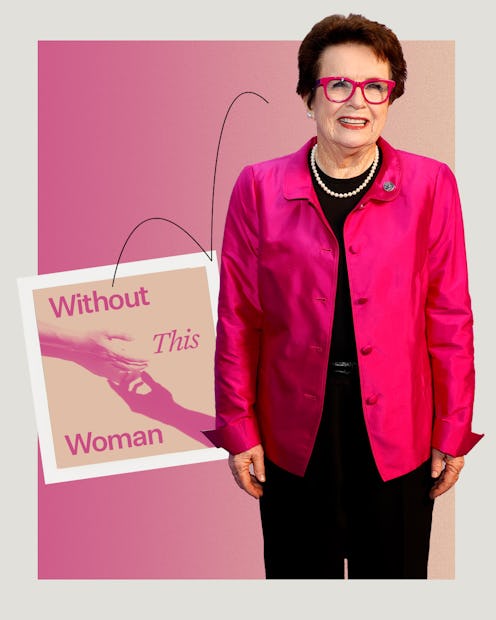Rule Breakers
Without This Woman, I Wouldn’t Have Known What No. 1 Looks Like
When a preteen Billie Jean King watched Althea Gibson play at the Los Angeles Tennis Club, her dreams solidified.

Bustle’s Without This Woman is a series of essays honoring the women who change and challenge us every day. Below, tennis legend Billie Jean King, who has a new partnership with e.l.f. SKIN, reflects on her friendship with Althea Gibson, the first Black player to win a Grand Slam title.
I first saw Althea at the Los Angeles Tennis Club. All the great players would come there, and I was one of the lucky ones, being born in Southern California. That was back in the 50s, when I was 12 or 13 years old. Althea was the No. 1 tennis player in the world.
I took in everything that I could that day. I took in how she played. I took in her power, her finesse. I watched her strategy.
My parents had taught me that every generation gets better. So I thought, “That means I have to be better than the way she’s playing?” She was fantastic, and it made me work even harder.
The thing that came through so clearly for that generation and generations before: They were [technically] amateurs. We didn’t have professional tennis until 1968; that’s when we first got a check. If you’re an amateur, it means it’s a hobby. You don’t make money. Well, this was not a hobby for any of us.
“She has a deep voice, melodic and beautiful. I loved listening to her. And I just learned about her journey.”
I was lucky to get to know her through the years. Our first significant conversation was at Wimbledon. This was probably 1966 or 1965. She was in the locker room, and we started talking. She has a deep voice, melodic and beautiful. I loved listening to her. And I just learned about her journey.
We always stayed in touch after I got to talk to her at Wimbledon. For a while, she was depressed and wouldn’t talk to anybody. I’d leave her messages all the time on her phone: “Thinking about you. I’d love to come and see you. Is there anything I can do for you? You’re still No. 1 in my heart and mind.” Things like that. Her friend told me she was getting the messages, and she did mention them later. In those days, people were very quiet about when they didn’t feel right or were sad.
She meant so much to so many of us. She led by example, I think, more than what she said. I watched how she carried herself and listened to her stories.
Without this woman, I wouldn’t have known what No. 1 looks like in our sport. Seeing it is really helpful in imagining it for yourself. Especially in a profession like sports, you have to really watch a lot of the other people. Watch what they do, watch how they win, why they win. The champions know how to win. They understand pressure and how to withstand it, but more importantly, how to use that pressure on and off the court.
I have this saying: Pressure’s a privilege, and champions adjust. When I say “champions,” I mean champions in life and on the court. Althea showed me both of those.
As told to Leila Barghouty. This interview has been condensed and edited for clarity.
This article was originally published on